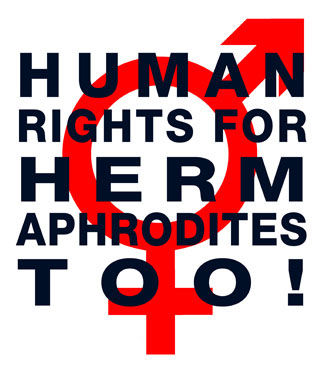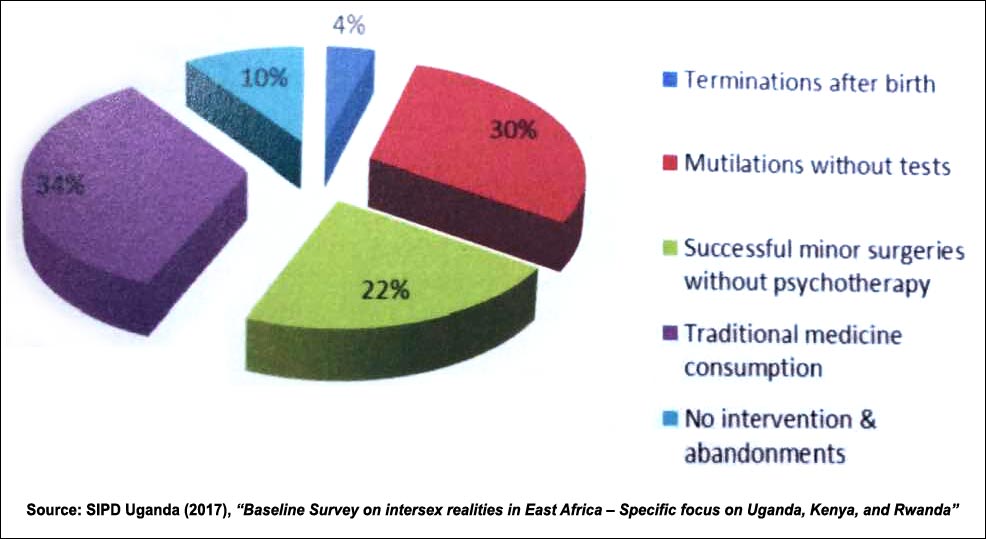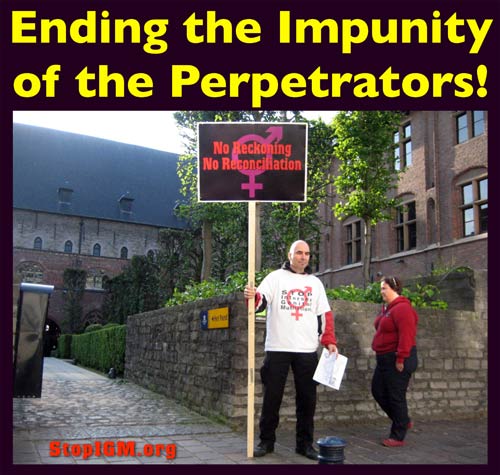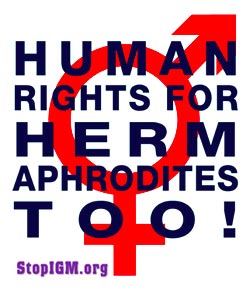 A newly published >>> “Baseline Survey on intersex realities in East Africa – Specific focus on Uganda, Kenya, and Rwanda” by SIPD Uganda | PDF documents serious human rights violation of intersex children including infanticide, intersex genital mutilation, abandonment and not being able to attend school. But also intersex adolescents and adults face ostracism, expulsion, harassment and curiosity rape, and intersex persons are often misrepresented as homosexuals. Ostracism, harassment and expulsion is also faced by parents of intersex children, particularly by mothers, who are considered to be witches or victims of witchcraft, and are abandoned by their husbands and in-laws.
A newly published >>> “Baseline Survey on intersex realities in East Africa – Specific focus on Uganda, Kenya, and Rwanda” by SIPD Uganda | PDF documents serious human rights violation of intersex children including infanticide, intersex genital mutilation, abandonment and not being able to attend school. But also intersex adolescents and adults face ostracism, expulsion, harassment and curiosity rape, and intersex persons are often misrepresented as homosexuals. Ostracism, harassment and expulsion is also faced by parents of intersex children, particularly by mothers, who are considered to be witches or victims of witchcraft, and are abandoned by their husbands and in-laws.
Such massive abuses of intersex persons also in Africa have been recognised by the UN as a serious human rights violation, particularly by the Committee on the Rights of the Child (CRC), the Committee against Torture (CAT) and the Committee on the Rights of Persons with Disabilities (CRCPD), which already condemned such violations also in Africa (namely CRC regarding South Africa and CRPD regarding Morocco), but also by the African Commission on Human and Peoples’ Rights (ACHPR), and also the Final declaration of the 2017 BanFGM Conference co-organised by the Inter-African Committee on Traditional Practices affecting the Health of Women and Children (IAC) explicitly mentions “intersex genital mutilation” and called to “support and promote victims […] through the provision of essential services (medical, psychological and legal) free of charge”!
Some key findings of the SIPD Ugands baseline survey (fulltext | PDF) on infanticide, expulsion, sexualised violence, intersex genital mutilation, superstition, denial of housing, denial of school education, and misrepresentation as homosexuals:
Infanticide, expulsion, sexualised violence
«In all three countries in this survey, namely, Uganda, Rwanda and Kenya when an intersex child is born, the family treats the birth with extreme secrecy – with intervention strategies limited to close family members. In all the responses we received, families will isolate the child from the general public. As standard treatment, the mother of such a child will be frowned upon, and most intersex infants will be killed shortly after birth. Those who are not killed face different forms of discrimination – for example, in Uganda intersex teenagers are forced to drop out of school and live a disempowered and secret life, often subjecting them to sexual violence in terms of curiosity rape and other forms of sexual and physical harassment. In Kenya, the family will send the intersex teenager away from home and from the village to find anywhere else to live and caution them never to return. In Rwanda, a few intersex young people have sought refuge in Nyamirambo camp for LGBTI destitute people but have been forced to leave for lack of safety and relevant services. Some have resorted to suicide. Usually superstition loom large as families consult witchdoctors, mediums and traditional healers for a solution. What would appear to be a positive story is for a scanty number of intersex people born into wealthy families, who avail them with medical information and where needed sex re-assignment surgeries. Even in these cases, the doctors were quick to note that no one is sure if the surgeries done are the right ones or if they will prove useful to the intersex child later on in their life.»
Intersex Genital Mutilation:
«There are many children in Uganda who have had involuntary surgical procedures and it has been parents and doctors who have spearheaded this. A mother in Mukono district said […] when this mother gave birth, the child had a very tiny penis that couldn’t be noticed. The husband wanted to know whether she gave birth to a boy or a girl and the in-laws were on her neck. There was an organization that helped her acquire medical help.It’s very unfortunate that the doctor who did the surgery didn’t tell her anything like implications and up today she is regretting why she made such a decision that her child should have a surgical procedure because what she was trying to protect, things just went worse as she was abandoned by the husband and the in-laws basing on all that happened since the surgery wasn’t a success but rather left emotional and physical scars.» (The full survey| PDF also contains photos of botched interventions – WARNING!)
Superstition, abandonment
«Women who give birth to intersex children are often considered to be witches or victims of witchcraft, and the intersex children are considered a bad omen to the family, which should be gotten rid of. The ridding takes the form of murders or abandonment. Many women are abandoned by their husbands and in-laws due to the news of such a birth. Most mothers of intersex children dump and abandon their intersex children for dead in pit latrines and lonely forest areas and run from their homes for fear of possible prejudice-driven crimes towards them by family or community members. It’s so unfortunate that the general East African society has always responded with denial, hostility and at best, silence, on these matters pertaining to sexual development and related health and rights concerns.»
«In Uganda if an intersex child is born in urban and rural areas of Uganda, it is considered to be a punishment for an offence the mother committed either in the present life or an earlier life. The child and the mother are expelled from the community, which is essential for survival. Therefore, many mothers kill their newborn baby, hoping that the child’s intersex remains undetected at the funeral, since other members of the community rarely touch the dead body during the funeral. And they continue to note that in Uganda we have failed to acknowledge that culture is not static it’s dynamic. This leading to sections of the communities all over the country to reproof intersex children as a population haunted by witch craft and as result basic care needs and health become a problems to these children in case they survive death.»
Denial of housing
«In Northern Uganda for example, intersex children are denied housing. They are separated from their siblings and put in remote huts on the peripheral of the homestead, further than where animals are kept. They argue that if this child is left to stay with siblings it’s very easy for this child to pass on the bad luck to other children in the family that are considered “normal”. There is another case in Rakai district where a child was moved from the main house and isolated in a small hut at the advice of the family’s in-laws. This was a measure to control the continuity of what is considered a bad omen in the family.
A typical homestead will have a main house and other sub houses. When an intersex child is born, they are removed from the main house and put into a small hut distanced from the main homestead to stop the bad omen affecting the entire family.»
Denial of school education
«The baseline found out that in Uganda and other East African countries, 90% of the intersex youth interviewed reported that they were forced to drop out of school because of the immense stigma and discrimination associated with the non-binary development of their intersex body.»
Misrepresentation as homosexuals
One intersex person in Masaka district was quoted saying: «“[..] [When] an intersex person passes [on the street], people will start arguing whether it’s a boy or a girl and consequently start to discuss his/her orientation and naming the intersex person all sorts of names. In fact since they fail in most cases to understand our bodies, they will think we are the ones who are the homosexuals.”»
>>> “Baseline Survey on intersex realities in East Africa – Specific focus on Uganda, Kenya, and Rwanda” by SIPD Uganda | PDF
See also:
• 26 UN Reprimands for IGM – and counting …
• “Harmful Medical Practice”: UN, COE, ACHPR, IACHR condemn IGM
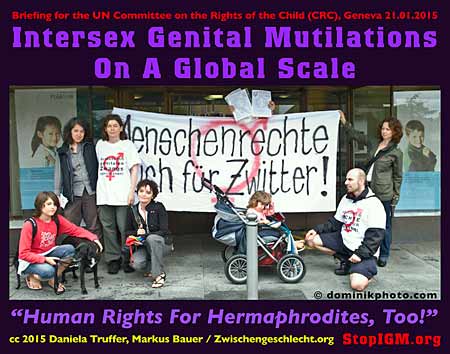 IGM on a Global Scale: 2015 UN-CRC Briefing
IGM on a Global Scale: 2015 UN-CRC Briefing
• IGM: A Survivor’s Perspective • Intersex Movement History
• What are Variations of Sex Anatomy? • What are IGM Practices?
• IGM and Human Rights • Conclusion: IGM as a Harmful Practice
>>> Download PDF (3.14 MB) >>> Table of Contents
Eliminating IGM practices by holding the perpetrators accountable via well-established applicable human rights frameworks, including Inhuman Treatment and Harmful Practices – Presentation @ UN expert meeting on Intersex Human Rights in Geneva 26.–27.10.2015
>>> Download PDF (831kb)
